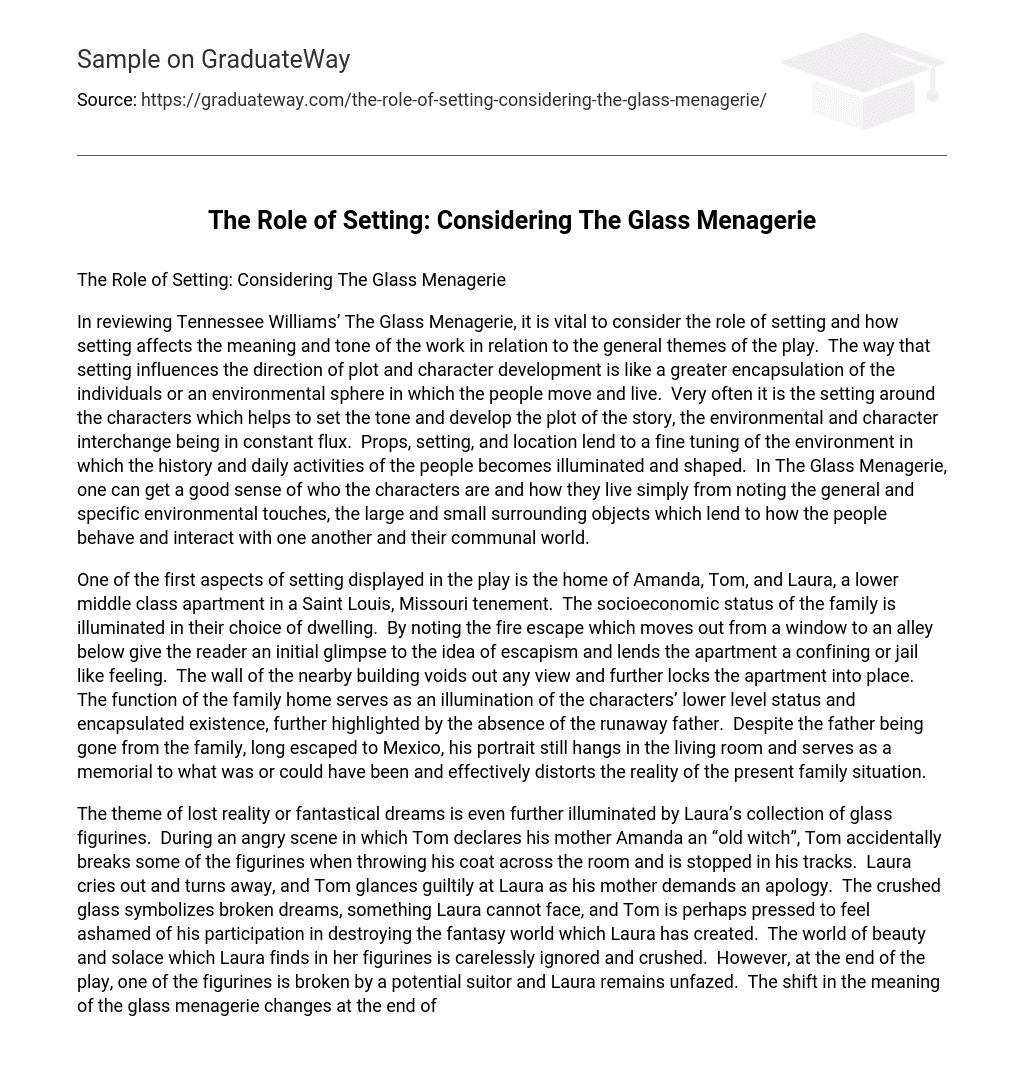In reviewing Tennessee Williams’ The Glass Menagerie, it is vital to consider the role of setting and how setting affects the meaning and tone of the work in relation to the general themes of the play. The way that setting influences the direction of plot and character development is like a greater encapsulation of the individuals or an environmental sphere in which the people move and live. Very often it is the setting around the characters which helps to set the tone and develop the plot of the story, the environmental and character interchange being in constant flux. Props, setting, and location lend to a fine tuning of the environment in which the history and daily activities of the people becomes illuminated and shaped. In The Glass Menagerie, one can get a good sense of who the characters are and how they live simply from noting the general and specific environmental touches, the large and small surrounding objects which lend to how the people behave and interact with one another and their communal world.
One of the first aspects of setting displayed in the play is the home of Amanda, Tom, and Laura, a lower middle class apartment in a Saint Louis, Missouri tenement. The socioeconomic status of the family is illuminated in their choice of dwelling. By noting the fire escape which moves out from a window to an alley below give the reader an initial glimpse to the idea of escapism and lends the apartment a confining or jail like feeling. The wall of the nearby building voids out any view and further locks the apartment into place. The function of the family home serves as an illumination of the characters’ lower level status and encapsulated existence, further highlighted by the absence of the runaway father. Despite the father being gone from the family, long escaped to Mexico, his portrait still hangs in the living room and serves as a memorial to what was or could have been and effectively distorts the reality of the present family situation.
The theme of lost reality or fantastical dreams is even further illuminated by Laura’s collection of glass figurines. During an angry scene in which Tom declares his mother Amanda an “old witch”, Tom accidentally breaks some of the figurines when throwing his coat across the room and is stopped in his tracks. Laura cries out and turns away, and Tom glances guiltily at Laura as his mother demands an apology. The crushed glass symbolizes broken dreams, something Laura cannot face, and Tom is perhaps pressed to feel ashamed of his participation in destroying the fantasy world which Laura has created. The world of beauty and solace which Laura finds in her figurines is carelessly ignored and crushed. However, at the end of the play, one of the figurines is broken by a potential suitor and Laura remains unfazed. The shift in the meaning of the glass menagerie changes at the end of the play. When Jim accidentally bumps the glass unicorn and its horn breaks off while dancing with Laura, she merely comments that now the unicorn is simply a regular horse. After receiving her first dance and kiss, perhaps Laura is freed from her constructed fantasy world and blossoms into a real woman.
The main setting and props serve to define the plot and the characters of Tennessee Williams’ play, utilizing effective symbolism to cast a feeling of containment and fantasy which eventually shatters enough to allow the characters to move forward in their own unique ways. The cage of the apartment also mirrors the cage of the dysfunctional family and their crippling relationships, yet the beauty sought in the idealistic world of the fantasy figurines in Laura’s glass menagerie finally begins to materialize in more realistic ways, encouraging an escape of Amanda’s children. The locked world in which dreams are the only service to desires and passions becomes more open in the end of the play, Laura experiencing the genuine affection of a romantic suitor and Tom seizing the opportunity to truly escape the family home.
Works Cited
Williams, Tennessee. The Glass Menagerie. Dramatists Play Service, Inc., 1948.





